Homeworld is still my dream RTS
Stuck in 1999.
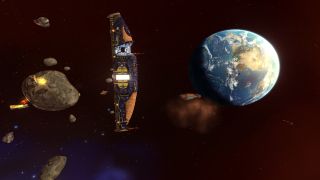
Oh no. I'm playing Homeworld again.
During my formative PC gaming years, the RTS was king. With every new game I could get my sweaty little hands on, there were dramatic leaps as some of the best developers of the day conjured up new systems, more elaborate conflicts and started to flex their storytelling muscles. There was the rivalry between Westwood and Blizzard pushing things forward, and then around them so many experiments, like the mind-bogglingly massive battles of Total Annihilation and Age of Empire's attempts to make a Civ-scale RTS. Then Homeworld arrived, and it was like staring into the future.
Westwood's Dune 2 was the RTS that really founded the genre, though it wasn't the first one. It took three years for it to spawn a challenger, which came in the form of Blizzard's Warcraft. It didn't change a whole lot, aside from the setting, but then Westwood responded with Command & Conquer and the competition began. The genre started to evolve rapidly, but in the mid-90s there was no way I could have imagined where things would end up just a few years down the line.
In the space of only four years, we went from this:
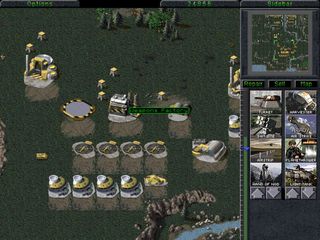
To this:
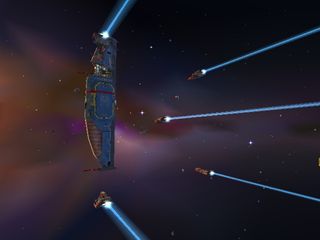
A fully 3D RTS set in space that looked that good didn't seem believable—surely it would end up being all eye candy and nothing else. But no, it was the real deal. From its hypnotic cosmic battles to its stirring orchestral score, it was, and still is, exceptional. Even the narrative design is noteworthy. There were plenty of RTS developers investing in story, but most of the time they just served to bookend missions—a cutscene here or there—whereas Relic opted for a holistic approach. Story was given a higher priority, and things like radio chatter and even gameplay systems, like your fleet persisting across missions, reinforce and enhance it.
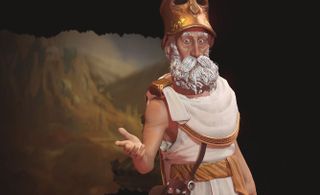
If all these words about Homeworld have got you ravenous for more nostalgia, why not read our mammoth history of the strategy game feature, where we go all the way back to the '70s and chart the genre's course.
Loss and desperation run all the way through the game, and they're made more tangible by their mechanical impact. If you get through a mission by the skin of your teeth, you'll have a whole other mission ahead of you where you'll really feel those losses. You're trying to preserve your species, trying to build a huge armada to keep them all safe, so taking a beating stings, and there are consequences. Tragedy is always nipping at your engines. This is brutally established in the game's third mission, which throws you into a harrowing rescue attempt where you have to secure cryo trays with slumbering passengers above your burning world, all while enemies are trying to wipe them out. To really hammer things home, it gives you the numbers. You can actually save all 600,000 people, but chances are you'll lose a lot of them.
The biggest gaming news, reviews and hardware deals
Keep up to date with the most important stories and the best deals, as picked by the PC Gamer team.
It's uncompromising. It's challenging to the point of occasionally being punishing, and it turns out that managing fleets in a vast 3D space is pretty tricky. The 2015 remaster made it more accessible, but it remains a game where you really have to work for your victories. It's a big job, saving your species, and Homeworld never lets you forget that the odds are stacked against you.
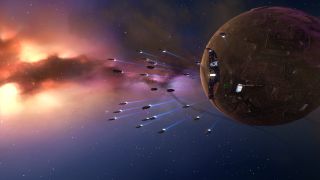
The fact that it's so damn gorgeous means that even when shit hits the fan and your armada is looking like a goner, at least you get something pretty to stare at. The unlocked 3D camera means you get all the best views of every fight, but the best way to watch Homeworld's battles—albeit not very tactically sound—is by fixing the camera on a single ship and getting real close. It's like being in a choreographed dance routine while you're also on a roller coaster.
RTS was heading into fascinating new territory, or so it seemed in 1999. There were still good things ahead. Blizzard was working on Warcraft 3, Total War was waiting in the wings, and Relic would continue its bold experiments in Company of Heroes, as well as releasing a second Homeworld. Some of the very best RTS games appeared in the 2000s, but it also marked the decline of the genre, with players migrating to consoles and publishers no longer investing in the former golden goose.
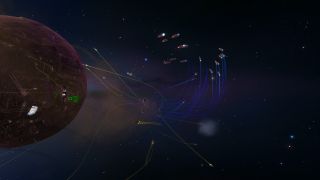
I'm trying to think of another time I was more excited about what was in store for the genre and coming up short. For all the impressive stuff that's come since, nothing has ever seemed quite as bold. The biggest RTS success story has undoubtedly been StarCraft 2, which has dominated the genre for over a decade, and it's great, but it's also just more StarCraft. Esports and MOBAs took over, and now Homeworld looks more like an evolutionary dead end than the future of RTS games.
More Homeworld has, at least, been a nice consolation prize. There was a big gap, but eventually we got Blackbird Interactive's Homeworld: Deserts of Kharak, a prequel set in the desert instead of in space. It very much lived up to the name, despite the change in setting, while not being beholden to it. It might have been an origin story drawing on nostalgia for the original Homeworld, but there was enough that was new so that it felt like progress. And now we've got Homeworld 3 on the way, apparently coming next year. I'll take all the Homeworld I can get. But none of them will compare to playing the first Homeworld, when it was like nothing I'd seen before, and dreaming about what was on the horizon.

Fraser is the UK online editor and has actually met The Internet in person. With over a decade of experience, he's been around the block a few times, serving as a freelancer, news editor and prolific reviewer. Strategy games have been a 30-year-long obsession, from tiny RTSs to sprawling political sims, and he never turns down the chance to rave about Total War or Crusader Kings. He's also been known to set up shop in the latest MMO and likes to wind down with an endlessly deep, systemic RPG. These days, when he's not editing, he can usually be found writing features that are 1,000 words too long or talking about his dog.
Most Popular

